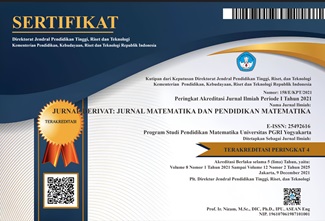Pembelajaran Problem Based Learning Berbantuan Wordwall Ditinjau dari Motivasi Belajar Siswa
DOI:
https://doi.org/10.31316/j.derivat.v11i3.6631Abstract
This study aims to see the learning motivation of students using a problem-based learning model assisted by wordwalls on the subject of the Cartesian coordinate system. The type of research is an experiment with the research design used, namely pre-test and post-test control group design. The population in this study was all grade VIII students of SMP MTs Negeri 1 Pagaralam. The samples used in this study are class VIII.3 (experimental class) and class VIII.5 (control class). Data collection uses documentation, tests and questionnaire methods. Then the data was processed using a statistical test of the t-test. Based on the results of the study using a problem-based learning model assisted by a wordwall, the average percentage of motivation indicators in the experimental class is 85.22%, which can be said to be very strong, and the average percentage of motivation indicators in the control class, which is 76.65%, can be said to be strong. So it can be seen that the motivation score for learning mathematics using the wordwall-assisted problem-based learning model has a high level of motivation after using the wordwall-assisted problem-based learning learning model.
Keywords: PBL, Learning Motivation, Wordwall, Coordinate Cartesius
References
Akbar, H. F., & Hadi, M. S. (2023). Pengaruh Penggunaan Media Pembelajaran. Community Development Journal, 4(2), 1653–1660.
Aliyah, A. A., & Purwanto, S. E. (2022). Pengaruh Media Pembelajaran Powtoon Terhadap Hasil Belajar Matematika Pada Materi Perkalian Siswa Kelas Ii Sekolah Dasar. Ideas: Jurnal Pendidikan, Sosial, Dan Budaya, 8(3), 921.
Amarta, N. (2022). Kemampuan Numerasi Siswa Pada Pembelajaran Koordinat Kartesisu Menggunakan Pendekatan Pmri Dengan Konteks Light Rail Transit (Lrt) Palembang Di Kelas Viii. Jurnal Pendidikan Matematika, 2.
Ananda, R., & Hayati, F. (2020). Variabel Belajar: Kompilasi Konsep. In Cv. Pusdikra Mj.
Aryanti, D. Y., Ulandari, S., & Nuro, A. S. (2022). Model Problem Based Learning Di Sekolah Dasar Dalam Kurikulum Merdeka. 4, 17.
Basaria, R., Setiawan, A., & Sediyono, E. (2018). Determination Of Regional Areas Of Regency And City In Central Sulawesi Province Using Polygon Method By Google Earth. Jurnal Mercumatika : Jurnal Penelitian Matematika Dan Pendidikan Matematika, 3(1), 9–22.
Febiani, S., Susanti, N., Rahayu, C., Garba, M. D., & Dhakal, A. (2023). Problem-based Learning Model Assisted by Interactive Animation Videos on Numeracy Ability in Spatial Building Materials. 7, 345–358.
Munawarah, F., Sukmawati, R. A., & Mahardika, A. I. (2021). Pengembangan Media Pembelajaran Interaktif Berbasis Web Materi Sistem Koordinat Kelas VIII dengan Metode Problem Based Learning. Computing and Education Technology Journal (CETJ), 1(1), 28–43.
Rahayu, Chika ; Anita, A. (2022). MODEL PEMBELAJARAN PROBLEM BASED LEARNING MENGGUNAKAN MATH CITY MAP STKIP Muhammadiyah Pagaralam , Pagar Alam , Indonesia Abstrak PENDAHULUAN Kemajuan teknologi informasi saat ini , memunculkan sistem pembelajaran berbasis digital yang salah satunya yaitu. 11(4).
Rahayu, C., & Indrayati, H. (2022). Problem Based Learning ( PBL ) Using Lego in Presenting Data. Matematika Dan Pendidikan Matematika, 6, 211–218.
Triyani, R. (2023). Penggunaan Game Interaktif Berbasis Wordwall Sebagai Media Pembelajaran Matematika Pada Siswa SMP. Jurnal Intellectual Mathematics Education, 1(1), 40–49.
Utama, Putra Helwandi; Widyaningrum, Indah; Rahayu, C. (2018). Problem based learning terhadap hasil belajar siswa pada materi balok kelas VIII. Jurnal Penelitian Pendidikan Dan Pengajaran Matematika, 4(2), 69–72. http://jurnal.uns.ac.id/jpm
Walidah & Achmad, S. S. (2022). Pengaruh penggunaan game edukasi wordwall terhadap motivasi dan hasil belajar matematika peserta didik. Journal UJMES, 07(02), 105–115.
Ganing, N. N. (2019). Model Project Based Learning Berlandaskan Tri Hita Karana. Jurnal Adat Dan Budaya, 1(2), 84–93.
Hamidah, D., Zanthy, L. S., & Siwi, D. R. (2023). Meningkatkan Motivasi Belajar Matematika Siswa Kelas 7 Smp Pada Materi Aritmatika Sosial Dengan Menggunakan Pendekatan Problem Based-Learning. Jurnal Pembelajaran Matematika Inovatif, 6(2), 693–702.
Komala, R. D. (2017). Tinjauan Implementasi Personal Selling Pada Pt. Astra Internasional. Jurnal Fakultas Ilmu Terapan Universitas Telkom, 3(1), 330.
Maryanti, R. I. (2022). Assesment For Learning Educandy & Wordwall (Dr. Dede Trie Kurniawan, S.Si, M.Pd & Penerbit: (Eds.)). Yayasan Rumah Rawda
Nasrah, A. M. (2020). Analisis Motivasi Belajar Dan Hasil Belajar Daring. Jurnal Riset Pendidikan Dasar, 03(2), 207–213.
Ningsih, W. (2021). Hubungan Media Pembelajaran Dengan Peningkatan Motivasi Belajar Siswa Pada Mata Pelajaran Pai Di Smp Iptek Sengkol Tangerang Selatan. Jurnal Tarbawi, 06(01).
Wijayanto, T., Supriadi, B., & Nuraini, L. (2020). Pengaruh Model Pembelajaran Project Based Learning Dengan Pendekatan Stem Terhadap. Jurnal Pembelajaran Fisika, 9, 113–120.
Yulanda, Y. Zubad Nurul. (2023). Pengembangan E-Lkpd Berbasis Pbl Dalam Kurikulum Merdeka. Jurnal Ilmiah Pendidikan Dasar, 08, 4049–4059.
Zebua, T. G. (2021). Teori Motivasi Abraham H. Maslow Dan Implikasinya Dalam Kegiatan Belajar Matematika. Range: Jurnal Pendidikan Matematika, 3(1), 68–76. Https://Doi.Org/10.32938/Jpm.V3i1.1185
Downloads
Published
Issue
Section
Citation Check
License
Copyright (c) 2025 Sela Nur Amelia Sandi

This work is licensed under a Creative Commons Attribution-ShareAlike 4.0 International License.
Authors who publish with this journal agree to the following terms:
-
Authors retain copyright and grant the journal right of first publication with the work simultaneously licensed under a Creative Commons Attribution-ShareAlike 4.0 International License that allows others to share the work with an acknowledgment of the work's authorship and initial publication in this journal.
- Authors are able to enter into separate, additional contractual arrangements for the non-exclusive distribution of the journal's published version of the work (e.g., post it to an institutional repository or publish it in a book), with an acknowledgment of its initial publication in this journal.
- Authors are permitted and encouraged to post their work online (e.g., in institutional repositories or on their website) prior to and during the submission process, as it can lead to productive exchanges, as well as earlier and greater citation of published work (See The Effect of Open Access).







